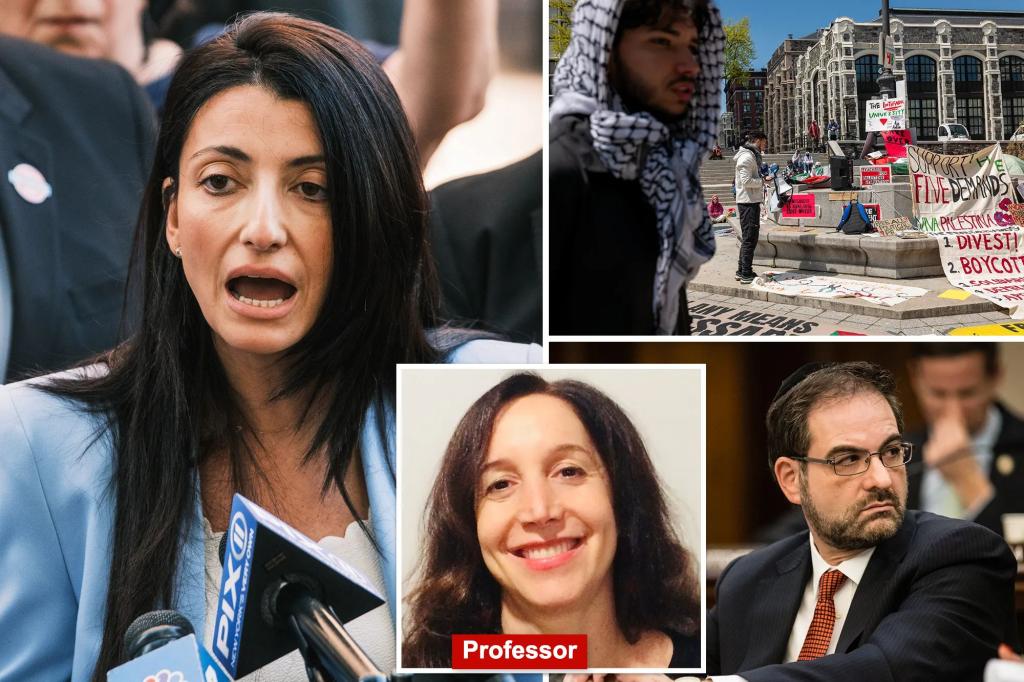The City University of New York (CUNY) finds itself embroiled in controversy surrounding the actions of an adjunct professor, Corinna Mullin, during anti-Israel protests at the City College of New York (CCNY) campus in April. Two City Council members, Inna Vernikov and Kalman Yeger, have accused Mullin of playing a key role in organizing the protests, which they allege resulted in $3 million in damages and numerous arrests. They are demanding a thorough investigation and potential disciplinary action, including termination, against Mullin and other participants responsible for the violence and destruction.
The protests, which took place on April 30th, saw approximately 170 anti-Israel demonstrators clashing with police, including Mullin, who was subsequently arrested. The events escalated into a fire on the roof of a science building, allegedly caused by a flare gun, and further acts of vandalism within an administrative building where glass doors were smashed and offices ransacked. Reports also indicate that protesters engaged in physical altercations with campus police, throwing rocks and using pepper spray, resulting in injuries to two officers. While Mullin received a summons following her arrest, the specific charges remain unclear.
Councilmembers Vernikov and Yeger, both Jewish, have expressed outrage over Mullin’s alleged involvement and the lack of accountability from CUNY. Their letter to Chancellor Felix Matos Rodriguez not only calls for an investigation into Mullin’s actions but also highlights her past affiliations with groups deemed by the Councilmembers to be anti-Israel, including Students for Justice in Palestine and Within Our Lifetime. They argue that Mullin’s conduct and associations demonstrate a pattern of hostility towards Israel and contribute to a climate of antisemitism on CUNY campuses. The Councilmembers emphasize the need for consequences for all individuals, including students and faculty, who participated in the violent demonstrations and contributed to the significant property damage.
Mullin’s attorney, Nancy Smith, vehemently denies the accusations, asserting that the Councilmembers’ letter contains false and defamatory statements. She maintains that Mullin’s participation was limited to a peaceful protest and that she did not engage in any unlawful activity. Smith points to the dismissal of a trespassing charge against Mullin as evidence of her innocence and further claims that the protesters from the CUNY community were non-violent and did not cause any damage. She dismisses the criticism as “McCarthyism” and insists that Mullin will not be intimidated. This clashing of narratives highlights the deep divisions surrounding the protests and the accusations of antisemitism.
The controversy surrounding Mullin’s involvement in the CCNY protests comes amidst broader concerns about antisemitism within the CUNY system. A recent independent report found that CUNY needs to overhaul its policies to address antisemitism on its campuses, further fueling the debate. A City Council higher education committee hearing last month, organized in response to the report, saw Chancellor Matos Rodriguez facing pointed questions from Vernikov, Yeger, and other council members about the disciplinary actions taken against students and faculty involved in the April demonstrations. Matos Rodriguez’s perceived evasiveness during the hearing has only intensified calls for greater transparency and accountability.
Adding to the complexity of the situation, a campus police officer revealed that at least six CUNY faculty members and 15 students were arrested during the April protests, yet none faced disciplinary action. This apparent lack of consequences has outraged some members of the CUNY community and further fueled the accusations of a double standard when it comes to addressing antisemitic incidents. The officer’s testimony underscores the challenges CUNY faces in balancing free speech with its responsibility to maintain a safe and inclusive environment for all members of its community. The lack of response from CUNY to requests for comment further exacerbates the tension and leaves many questions unanswered. The ongoing controversy surrounding Mullin and the CCNY protests highlights the deep divisions and challenges facing CUNY as it grapples with complex issues of free speech, antisemitism, and campus safety.

